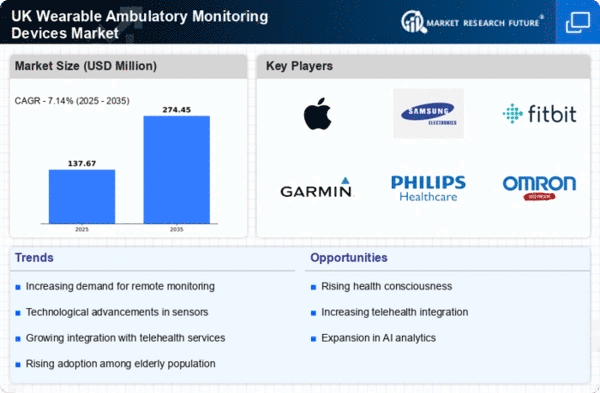The wearable ambulatory-monitoring-devices market is characterized by a dynamic competitive landscape. This landscape is driven by technological advancements and an increasing consumer focus on health and wellness. Major players such as Apple Inc (US), Samsung Electronics (KR), and Philips Healthcare (NL) are at the forefront, each adopting distinct strategies to enhance their market positioning. Apple Inc (US) continues to innovate with its health-focused features, integrating advanced sensors and health monitoring capabilities into its devices, thereby appealing to a health-conscious demographic. Meanwhile, Samsung Electronics (KR) emphasizes regional expansion and partnerships, particularly in the European market, to bolster its presence and diversify its product offerings. Philips Healthcare (NL) focuses on digital transformation, leveraging data analytics to improve patient outcomes and streamline healthcare processes, which positions it favorably in the evolving landscape of health technology.
The market structure appears moderately fragmented, with a mix of established players and emerging startups. Key tactics such as localizing manufacturing and optimizing supply chains are increasingly prevalent among these companies, allowing them to respond swiftly to market demands and enhance operational efficiency. The collective influence of these major players shapes competitive dynamics, as they vie for market share through innovation and strategic collaborations.
In October 2025, Apple Inc (US) announced the launch of its latest smartwatch, which features enhanced health monitoring capabilities, including advanced heart rate tracking and blood oxygen level measurement. This strategic move not only reinforces Apple's commitment to health technology but also positions it as a leader in the wearable segment, appealing to consumers seeking comprehensive health insights. The introduction of these features is likely to attract a broader audience, further solidifying Apple's market dominance.
In September 2025, Samsung Electronics (KR) entered into a partnership with a leading health data analytics firm to enhance its wearable device functionalities. This collaboration aims to integrate AI-driven health insights into Samsung's devices, potentially transforming user experiences and providing personalized health recommendations. Such strategic alliances may enable Samsung to differentiate its offerings in a competitive market, thereby enhancing customer loyalty and engagement.
In August 2025, Philips Healthcare (NL) unveiled a new line of wearable devices designed specifically for chronic disease management. This initiative reflects Philips' strategic focus on addressing the growing demand for remote patient monitoring solutions. By targeting chronic conditions, Philips is likely to capture a significant share of the market, as healthcare providers increasingly seek effective tools for managing patient care outside traditional settings.
As of November 2025, current trends in the wearable ambulatory-monitoring-devices market include a pronounced shift towards digitalization, sustainability, and AI integration. Strategic alliances are becoming increasingly vital, as companies recognize the need for collaborative innovation to stay competitive. Looking ahead, it appears that competitive differentiation will evolve from traditional price-based strategies to a focus on technological innovation, enhanced user experiences, and supply chain reliability. This shift may redefine market dynamics, compelling companies to invest in R&D and forge strategic partnerships to maintain their competitive edge.























Leave a Comment